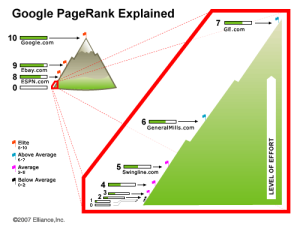As a web manager finding organic search traffic should be on the top of your to do list. You might have perhaps heard the phrase “Google Page rank”. What is Page rank, and how might a websites Page rank effect search engine ranking positions? I’ll address those questions and try to provide some insight into this often puzzling topic.
What exactly is Google Page rank?
Google developed the particular “pagerank” system several years ago for the purpose of gauging how important a site is. The better the page rank, the more important Google thinks the webpage will be. Google uses this gauge in its ranking formula.
Where does page rank derive from?
Page rank is about web pages linking to other web pages. You observe, every page that Google indexes features a pagerank value connected with it. Every time a page links to a different page, a component of that pagerank value flows towards the page it inbound links to. Higher position pages, pass more page rank towards pages they link back to.
What happens is, when one page links to a different page online, it’s a lot like getting a vote of confidence among web pages. With every link attained on a single web page it gives that particular web page a vote of confidence that it is a reliable source of information and can be trusted. The higher the rank the more authority it carries.
Pagerank is really simply a mathematical calculation that will determine how relevant a webpage will be based upon how relevant the particular pages that link back to it are.
An essential point here that may be often misunderstood is that pagerank is handed down to a page simply through a page by page basis. Many webmasters assume a sites pagerank is determined by its main page which is the home page. While it’s true that the main page is usually the highest ranking page inside a website, it doesn’t need to be. Any page on the given website could easily rank higher than the main page.
The myth of the homepage holding the highest pagerank comes from the truth that many webmasters, especially webmasters who are not up to date on current trends tend to believe. This was true back in the old days in reciprocal linking programs where they’d exchange links to each others homepages. Consequently, by default, the homepage finished up with the highest pagerank for the reason that it had one of the most links pointing to it.
So how does pagerank affect your search engine ranking positions?
Pagerank is not as powerful a ranking factor as it once was. There was clearly a time when all you needed to do was have enough websites linking to your site and you could potentially dominate virtually any keyword you required. Today, the ranking algorithm is a bit more complex. Many other factors are considered. However, pagerank does nonetheless play a reasonably important roll so getting backlinks remains a major process in the search engine optimization world. However the way we in which we go about getting those inbound links has changed dramatically.
How to check a web sites pagerank?
Google offers a free toolbar you could download and install on your machine. One of the things this toolbar does is usually to display the PR of whatever webpage you are looking at. There are other sources such as if you use Firefox as your browser you could search for several plugins that can be added to display site statistics as you browse the web.
One remaining note, my recommendation is usually to never worry an excessive amount about Pagerank when it comes to total SEO/SEM. Build your internet site to the best of your ability; create well written, compelling web pages and you should get backlinks normally. Furthermore, take some of your better articles and submit them to a few article directories – include a resource box which links back to your site and you should get some superb backlinks pretty quickly. Just stay away from reciprocal linking activities, whatever benefit many people once had is now over.

